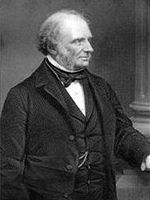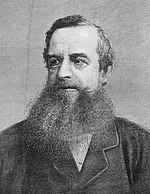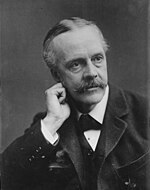Lord President of the Council
The office of Lord President of the Council is a British cabinet position. Its owner is the President of the Privy Council . In the territories of the Holy Roman Empire and the later German monarchies, this position corresponds to that of the Chairman of the Secret Council . The main task of the president is to preside over meetings at which orders-in-councils are issued, which the British monarch must formally approve. The incumbent has been Jacob Rees-Mogg from the Conservative Party since July 24, 2019 .
The Lord President of the Council is the fourth among the Great Officers of State and succeeds the Lord High Steward (Court Marshal), the Lord High Chancellor (Lord Chancellor) and the Lord High Treasurer (Lord Treasurer).
Since the duties of this office are not too extensive, the duties are often taken over by a government minister, usually of high rank and without portfolio. More recently, it was customary for the President of the Council at the same time the lower house , or at the same time the upper house pre ate. Since 2015, the spokesman for the majority parliamentary group in the lower house has also been Lord President.
In the 19th century the President of the Council was a cabinet member a. a. responsible for the education system, which at the time was still the responsibility of the Privy Council, but whose influence was increasingly curtailed in the late 19th and early 20th centuries.
The Lord President played a particularly important role during World War II as chairman of the Lord President's Committee , which was concerned with the economic problems raised by the defense of the country. This committee made a vital contribution to the success of the British war economy and, ultimately, the war effort.
Many of the Lords Presidents were very influential politicians, including numerous Prime Ministers or Governors General and Viceroys of India .
Lords President 1530–1553
- Charles Brandon, 1st Duke of Suffolk (1530-1545)
- William Paulet, 1st Marquess of Winchester (1546–1550)
- John Dudley, 1st Duke of Northumberland (1550–1553)
- Henry FitzAlan, 19th Earl of Arundel (1553–?)
Lords President 1621-1631
- Henry Montagu, 1st Earl of Manchester (1621-1628)
- James Ley, 1st Earl of Marlborough (1628)
- Edward Conway, 1st Viscount Conway (1628-1631)
Lords President since 1678



- Anthony Ashley Cooper, 1st Earl of Shaftesbury (1679)
- John Robartes, 1st Earl of Radnor (1679–1684)
- Laurence Hyde, 1st Earl of Rochester (1684–1685)
- George Savile, 1st Marquess of Halifax (1685)
- Robert Spencer, 2nd Earl of Sunderland (1685–1688)
- Thomas Osborne, 1st Duke of Leeds (1689–1699)
- Thomas Herbert, 8th Earl of Pembroke (1699–1702)
- Charles Seymour, 6th Duke of Somerset (1702)
- Thomas Herbert, 8th Earl of Pembroke (1702–1708)
- John Somers, 1st Baron Somers (1708-1710)
- Laurence Hyde, 1st Earl of Rochester (1710-1711)
- John Sheffield, 1st Duke of Buckingham and Normanby (1711-1714)
- Daniel Finch, 2nd Earl of Nottingham (1714-1716)
- William Cavendish, 2nd Duke of Devonshire (1716-1718)
- Charles Spencer, 3rd Earl of Sunderland (1718–1719)
- Evelyn Pierrepont, 1st Duke of Kingston-upon-Hull (1719-1720)
- Charles Townshend, 2nd Viscount Townshend (1720–1721)
- Henry Boyle, 1st Baron Carleton (1721-1725)
- William Cavendish, 2nd Duke of Devonshire (1725–1729)
- Thomas Trevor, 1st Baron Trevor (1730)
- Spencer Compton, 1st Earl of Wilmington (1730-1742)
- William Stanhope, 1st Earl of Harrington (1742–1745)
- Lionel Sackville, 1st Duke of Dorset (1745–1751)
- John Carteret, 2nd Earl Granville (1751–1763)
- John Russell, 4th Duke of Bedford (1763-1765)
- Daniel Finch, 8th Earl of Winchilsea (1765–1766)
- Robert Henley, 1st Earl of Northington (1766–1767)
- Granville Leveson-Gower, 1st Marquess of Stafford (1767–1779)
- Henry Bathurst, 2nd Earl Bathurst (1779–1782)
- Charles Pratt, 1st Earl Camden (1782–1783)
- David Murray, 2nd Earl of Mansfield (1783)
- Granville Leveson-Gower, 1st Marquess of Stafford (1783–1784)
- Charles Pratt, 1st Earl Camden (1784–1794)
- William Fitzwilliam, 4th Earl Fitzwilliam (1794)
- David Murray, 2nd Earl of Mansfield (1794–1796)
- John Pitt, 2nd Earl of Chatham (1796-1801)
- William Henry Cavendish-Bentinck, 3rd Duke of Portland (1801-1805)
- Henry Addington, 1st Viscount Sidmouth (1805)
- John Jeffreys Pratt, 2nd Earl Camden (1805-1806)
- William Fitzwilliam, 4th Earl Fitzwilliam (1806)
- Henry Addington, 1st Viscount Sidmouth (1806-1807)
- John Jeffreys Pratt, 2nd Earl Camden (1807-1812)
- Henry Addington, 1st Viscount Sidmouth (1812)
- Dudley Ryder, 1st Earl of Harrowby (1812-1827)
- William Bentinck, 4th Duke of Portland (1827–1828)
- Henry Bathurst, 3rd Earl Bathurst (1828–1830)
- Henry Petty-Fitzmaurice, 3rd Marquess of Lansdowne (1830–1834)
- James St Clair-Erskine, 2nd Earl of Rosslyn (1834-1835)
- Henry Petty-Fitzmaurice, 3rd Marquess of Lansdowne (1835–1841)
- James Stuart-Wortley, 1st Baron Wharncliffe (1841–1845)
- Walter Montagu Douglas Scott, 5th Duke of Buccleuch (1846)
- Henry Petty-Fitzmaurice, 3rd Marquess of Lansdowne (1846-1852)
- William Lowther, 2nd Earl of Lonsdale (1852)
- Granville George Leveson-Gower, 2nd Earl Granville (1852-1854)
- John Russell, 1st Earl Russell (1854–1855)
- Granville George Leveson-Gower, 2nd Earl Granville (1855-1858)
- James Gascoyne-Cecil, 2nd Marquess of Salisbury (1858-1859)
- Granville George Leveson-Gower, 2nd Earl Granville (1859–1866)
- Richard Temple-Nugent-Brydges-Chandos-Grenville, 3rd Duke of Buckingham and Chandos (1866–1867)
- John Spencer-Churchill, 7th Duke of Marlborough (1867–1868)
- George Robinson, 1st Marquess of Ripon (1868–1873)
- Henry Bruce, 1st Baron Aberdare (1873–1874)
- Charles Gordon-Lennox, 6th Duke of Richmond (1874–1880)
- John Spencer, 5th Earl Spencer (1880-1883)
- Chichester Parkinson-Fortescue, 1st Baron Carlingford (1883-1885)
- Gathorne Gathorne-Hardy, 1st Earl of Cranbrook (1885–1886)
- John Spencer, 5th Earl Spencer (1886)
- Gathorne Gathorne-Hardy, 1st Earl of Cranbrook (1886-1892)
- John Wodehouse, 1st Earl of Kimberley (1892-1894)
- Archibald Philip Primrose, 5th Earl of Rosebery (1894–1895)
- Spencer Cavendish, 8th Duke of Devonshire (1895-1903)
- Charles Vane-Tempest-Stewart, 6th Marquess of Londonderry (1903-1905)
- Robert Crewe-Milnes, 1st Marquess of Crewe (1905-1908)
- Edward Marjoribanks, 2nd Baron Tweedmouth (1908)
- Henry Fowler, 1st Viscount Wolverhampton (1908-1910)
- William Lygon, 7th Earl Beauchamp (1910)
- John Morley, 1st Viscount Morley of Blackburn (1910-1914)
- William Lygon, 7th Earl Beauchamp (1914–1915)
- Robert Crewe-Milnes, 1st Marquess of Crewe (1915-1916)
- George Curzon, 1st Marquess Curzon of Kedleston (1916-1919)
- Arthur James Balfour, 1st Earl of Balfour (1919-1922)
- James Gascoyne-Cecil, 4th Marquess of Salisbury (1922-1924)
- Charles Cripps, 1st Baron Parmoor (1924)
- George Curzon, 1st Marquess Curzon of Kedleston (1924–1925)
- Arthur James Balfour, 1st Earl of Balfour (1925–1929)
- Charles Cripps, 1st Baron Parmoor (1929–1931)
- Stanley Baldwin (1931-1935)
- Ramsay MacDonald (1935-1937)
- Edward Wood, 1st Earl of Halifax (1937-1938)
- Douglas Hogg, 1st Viscount Hailsham (1938)
- Walter Runciman, 1st Viscount Runciman of Doxford (1938–1939)
- James Stanhope, 7th Earl Stanhope (1939-1940)
- Neville Chamberlain (1940)
- John Anderson, 1st Viscount Waverley (1940-1943)
- Clement Attlee (1943-1945)
- Frederick Marquis, 1st Earl of Woolton (1945)
- Herbert Stanley Morrison (1945–1951)
- Christopher Addison, 1st Viscount Addison (1951)
- Frederick Marquis, 1st Earl of Woolton (1951–1952)
- Robert Gascoyne-Cecil, 5th Marquess of Salisbury (1952–1957)
- Alec Douglas-Home, 14th Earl of Home (1957)
- Quintin Hogg, 2nd Viscount Hailsham (1957-1959)
- Alec Douglas-Home, 14th Earl of Home (1959–1960)
- Quintin Hogg, 2nd Viscount Hailsham (1960–1964)
- Herbert Bowden (1964-1966)
- Richard Crossman (1966-1968)
- Fred Peart, Baron Peart (1968-1970)
- William Whitelaw (1970–1972)
- Robert Carr, Baron Carr of Hadley (1972)
- James Prior (1972–1974)
- Edward Short (1974-1976)
- Michael Foot (1976-1979)
- Christopher Soames, Baron Soames (1979-1981)
- Francis Pym (1981-1982)
- John Biffen (1982-1983)
- William Whitelaw, 1st Viscount Whitelaw (1983–1988)
- John Wakeham (1988-1989)
- Geoffrey Howe (1989–1990) (resigned)
- John MacGregor, Baron MacGregor of Pulham Market (1990-1992)
- Tony Newton (1992-1997)
- Ann Taylor, Baroness Taylor of Bolton (1997-1998)
- Margaret Beckett (1998-2001)
- Robin Cook (2001-2003) (resigned)
- John Reid (2003)
- Gareth Williams, Baron Williams of Mostyn (2003) (deceased in office)
- Valerie Amos, Baroness Amos (2003-2007)
- Catherine Ashton, Baroness Ashton of Upholland (2007-2008)
- Janet Royall, Baroness Royall of Blaisdon (2008-2009)
- Peter Mandelson, Baron Mandelson (2009-2010)
- Nick Clegg (2010-2015)
- Chris Grayling (2015-2016)
- David Lidington (2016-2017)
- Andrea Leadsom (2017-2019)
- Mel Stride (May 2019-July 2019)
- Jacob Rees-Mogg (since July 2019)
literature
- Lord President of the Council . In: Encyclopædia Britannica . 11th edition, London 1910-1911, Volume 17, p. 5.
Web links
- Lord President of the Council on the UK Government website
Individual evidence
- ↑ Jacob Rees Mogg on the UK Government website, accessed July 25, 2019. (English)






